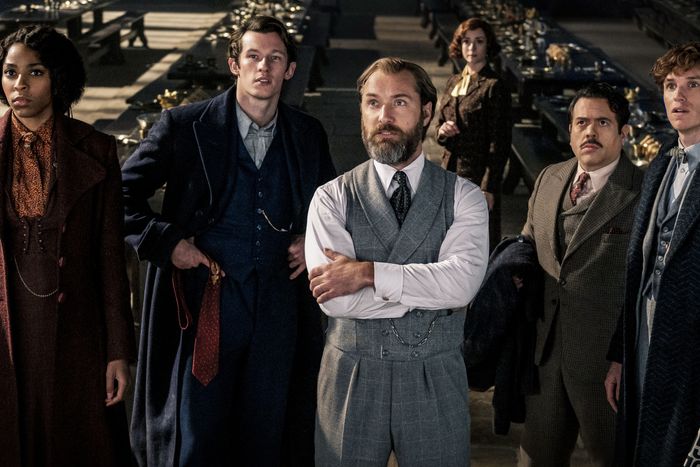
Like a listless 20-something who’s moved home after college with no idea what to do next, the Fantastic Beasts series keeps seeking out the familiarity of high school. The Secrets of Dumbledore, the third and most recent installment, is about nothing short of a skirmish for the soul of the wizarding world, and it still finds a way to make a stop at Hogwarts. The movie is a dour-looking thing overall, but it briefly turns honey-colored in a sequence that glimpses a student swooping by on a broomstick, wanders through the Great Hall, and visits the Room of Requirement. It’s viscous with a nostalgia that goes beyond fan service, as though the film itself were yearning to return to a simpler time — when its leads were played by carefully chosen unknowns instead of trouble-prone stars, when its source material’s author was a fairy-tale success story rather than an infamous transphobe, and when it could hawk some cozy, magical British boarding-school details rather than devote all its focus to an approaching war with Wizard Hitler.
Or maybe all The Secrets of Dumbledore is yearning for is some structure and reason for being. Fantastic Beasts is in the middle of floundering through a planned five-film run it may never actually finish — a decision that hinges on audience interest but may also owe something to the fact that no one involved in these movies seems to have any idea what their appeal is supposed to be. The Secrets of Dumbledore is, like the first two films, directed by David Yates and written by J.K. Rowling, this time with the help of Harry Potter screenwriter Steve Kloves. It’s slightly more coherent than 2018’s The Crimes of Grindelwald, which is saying something given that its characters embark on missions they don’t understand in an effort to stymie the clairvoyant ability that Gellert Grindelwald (played by a game Mads Mikkelsen, taking over for a now radioactive Johnny Depp) bloodily obtains. But it’s woefully pleasure free from the first scene, in which Grindelwald’s underlings kill a rare animal called a qilin and steal its young, to the final showdown in a village high in the mountains of Bhutan.
Eddie Redmayne, hunching his shoulders and exuding hesitancy as Newt Scamander, is still the nominal lead, but after spending two films with an unconventional hero, The Secrets of Dumbledore is champing at the bit to shift its focus to a more standard one — like, for instance, the dashing Albus Dumbledore (Jude Law), who comes to the forefront and offers an explanation for why he has been so committed to staying on the sidelines. In the process, he reveals himself to be gay (by way of some conveniently excisable dialogue) and a onetime wizard supremacist. Fantastic Beasts, should it continue, is headed for an epic showdown of sorcerous exes, something that would be more exciting if the films didn’t traffic in such murky digital effects and if Law and Mikkelsen shared something more than the sizzling chemistry of two colleagues exchanging pleasantries at a trade show. Other characters include Alison Sudol as accidental Wizard Nazi Queenie Goldstein, a barely trying Ezra Miller (still around for now) as tragic magical plot device Credence Barebone, Josh Gad’s tethered Dan Fogler as token Muggle Jacob Kowalski, Victoria Yeates as Newt’s smitten assistant Bunty Broadacre, William Nadylam as some guy, and Callum Turner as some other guy. Katherine Waterston has effectively been banished, her character Tina Goldstein busy and therefore “not available” for more than an extended cameo. But Jessica Williams is around, and as Dumbledore ally and American charms professor Lally Hicks, she does a fun if unsteady approximation of a mid-Atlantic accent.
In this era of IP and readily mobilized fandoms, we talk a lot about how much the power balance has shifted from individuals’ creative visions toward audience desires. But Fantastic Beasts has the opposite problem. It’s the product of a lucrative fictional universe that no one seems to know how to build on but which feels the need to keep going anyway, a franchise in search of a story. If the series was conceived as a way to hold on to the fans of the original books and movies who are now grown, what’s clear in practice is it’s a children’s story staggering to support a few ambitious and deeply underdeveloped themes. The final act of The Secrets of Dumbledore involves a magical act of voter fraud, and the plot pivots on a disagreement about whether purveyors of hate should be given a platform so the public can decide whether to reject their ideas. Despite this, the film has no real desire to explore why its charismatic villain is able to rally adoring crowds to his side, a development that would apparently be too dark — every follower we do get a closer look at feels bad about their choices. Neither bold enough to be provocative nor able to capture the appeal of the original films, Fantastic Beasts is stuck in limbo, having failed to grasp what should now be obvious: Adult devotees are far more likely to want to crawl back into childhood comfort than to see the wizarding world struggle to reflect the real one.
More movie reviews
- Fernanda Torres Is a Subtle Marvel in I’m Still Here
- Grand Theft Hamlet Is a Delightful Putting-on-a-Show Documentary
- Presence Is the Best Thing Steven Soderbergh’s Done in Ages


